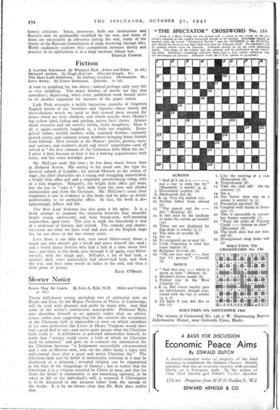Shorter Notice
THESE half-dozen essays, including two of particular note on Death and Fear, by the Regius Professor of Physic at Cambridge, will be read with pleasure and profit by many who may find some of the writer's conclusions inacceptable. Professor Ryle, who describes himself as an agnostic rather than an atheist, comes rather near suggesting that for the scientist the acceptance of the Christian faith is impossible-a view on which members of his own profession like Lister or Henry Vaughan would have had a good deal to say-and never quite grasps what the Christian faith really is. A disbeliever in personal immortality himself, he holds that " science could create a faith of which no Christian need be ashamed," and goes on to contrast the alternatives for the Christian between " a Judgement successfully circumvented and a seat in Heaven won, and, on the other hand, a lapse into well-earned sleep after a good and active Christian life." The Christian faith and the belief in immortality inherent in it may be dismissed as a delusion ; revealed religion can be stigmatised as the fruit .of the imaginings of fanatics ; but to realise that for Christians it is a religion revealed by Christ to men, and that for them the belief in immortality is not something optional, to be taken or left at the individual's will, is essential if Christianity is to be discussed to any purpose either from the outside or the inside. It is by no means clear that Dr. Ryle does realise that.






















 Previous page
Previous page